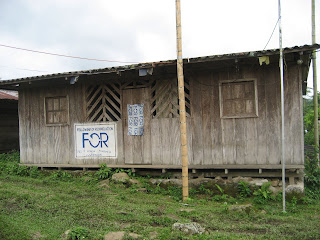Funny how in traveling to rural Colombia I found one of the things I missed most from growing up in Michigan: thunderstorms.
Days here in San José alternate between cloudy and sunny, really hot and just plain hot, but come evening a thunderstorm is nearly guaranteed. Soon after sunset - which happens at essentially the same hour all year, since we're so close to the equator - lightening begins to break in they darkened sky. Soon after, the rumblings of thunder can be heard in the distance, and the wind picks up just a bit. After maybe half an hour, the rain starts pegging our tin roof, and at times doesn’t let up until dawn. It ebbs and flows, however, so if we’re out visiting a neighbor, we can wait for an ebb in order to race home without getting too soaked. Hopefully we remember to put on our botas – rubber boots – before leaving the house, so as not to get stuck in one of the many mud puddles the rain invariably creates.
Rain like this means we’re in winter right now. Using the term “winter" here, when the tempature seldom drops below 85, is a bit laughable to a Michigander like myself. What is even more amusing, however, is that winter is a season that lasts most of the year – at least 9 of twelve months. Basically, it rains here all the time. If by chance there are a few days without rain, people start talking about it being “summer.” This kind of summer never lasts more than a few days, though; soon, it’s raining yet again.
Rain like this also means things grow like crazy here. That’s a big part of the reason this region has long been the banana-growing center of Colombia, as I discussed in my last post, and why this land is so hotly contested between armed groups and the civilians who simply want to farm here. It’s also why I’ve been so excited to get a garden started in our backyard.


